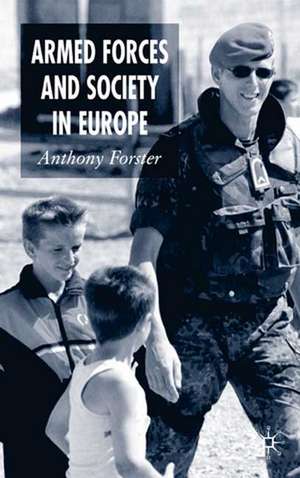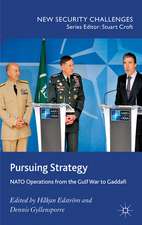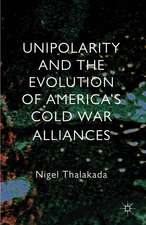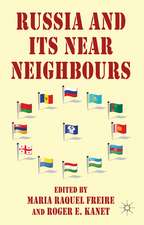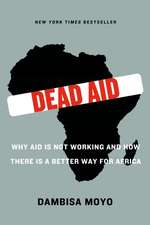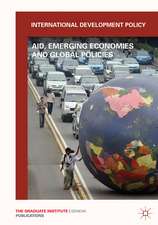Armed Forces and Society in Europe
Autor A. Forsteren Limba Engleză Hardback – 31 oct 2005
| Toate formatele și edițiile | Preț | Express |
|---|---|---|
| Paperback (1) | 639.73 lei 6-8 săpt. | |
| Palgrave Macmillan UK – 27 oct 2005 | 639.73 lei 6-8 săpt. | |
| Hardback (1) | 642.03 lei 6-8 săpt. | |
| Palgrave Macmillan UK – 31 oct 2005 | 642.03 lei 6-8 săpt. |
Preț: 642.03 lei
Preț vechi: 755.33 lei
-15% Nou
Puncte Express: 963
Preț estimativ în valută:
122.85€ • 128.27$ • 101.68£
122.85€ • 128.27$ • 101.68£
Carte tipărită la comandă
Livrare economică 05-19 aprilie
Preluare comenzi: 021 569.72.76
Specificații
ISBN-13: 9781403903648
ISBN-10: 1403903646
Pagini: 320
Ilustrații: VIII, 320 p.
Dimensiuni: 140 x 216 x 25 mm
Greutate: 0.46 kg
Ediția:2006
Editura: Palgrave Macmillan UK
Colecția Palgrave Macmillan
Locul publicării:London, United Kingdom
ISBN-10: 1403903646
Pagini: 320
Ilustrații: VIII, 320 p.
Dimensiuni: 140 x 216 x 25 mm
Greutate: 0.46 kg
Ediția:2006
Editura: Palgrave Macmillan UK
Colecția Palgrave Macmillan
Locul publicării:London, United Kingdom
Cuprins
Preface and Acknowledgements Introduction Democratic Governance of Armed Forces in Europe Military Reform of Armed Forces in Europe Armed Forces and Society: Changing Roles and Legitimacy Armed Forces and Societies: Differences and Similarities European Security Communities and Armed Forces Military Cooperation and Assistance in Europe International Peacekeeping and European Armed Forces Domestic Military Assistance in Europe Conclusion: Patterns and Trends in Armed Forces and Society Relations Bibliography
Recenzii
'Fifteen years have elapsed since the end of the Cold War - at least in the West - and, since then, the role of the armed services as well as the relationships between military and society have been transformed. Anthony Forster provides a wide-ranging and perceptive analysis of these changes blending insights from theories in military sociology and political science as well as the most recent findings of empirical research. He compares and contrasts the experiences of Western and post-Communist Europe and provides a lucid and lively discussion that will be of interest to both scholars and policy practitioners in the broad field of defence studies. Undergraduate and postgraduate students and teachers will find it invaluable.' - Professor Christopher Dandeker, Department of War Studies, King's College London, UK
'This book provides the reader with a thorough analysis of recent transformations of civil-military relations in both Western and Eastern European societies. In the context of post Cold War and post 9/11 environment, Anthony Forster has written a truly comprehensive study about changing domestic and international roles of the armed forces. Academics will be inspired whereas policy-makers will be sobered by reading this genuinely innovative and informative volume.' - Dr. Hans Born, Senior Fellow, Geneva Centre for the Democratic Control of Armed Forces
'New Civil-Military Relations in Europe is a vital contribution to the dialogue about 'the postmodern military'. Anthony Forster, a leader of a new generation of European scholars of the military and society, builds on earlier scholarship and extends the analyses to a wide variety of cases. Along the way he unearths a wealth of useful data. The book has a well developed theoretical focus, which academicians will appreciate, but it is also well written and accessible to a lay audience. I highly recommend it for personal and professional libraries and for use as a textbook in advanced undergraduate or graduate courses in civil-military relations.' - Professor John Allen Williams, Loyola University Chicago, USA, Chair and President, Inter-University Seminar on Armed Forces and Society
'This book provides the reader with a thorough analysis of recent transformations of civil-military relations in both Western and Eastern European societies. In the context of post Cold War and post 9/11 environment, Anthony Forster has written a truly comprehensive study about changing domestic and international roles of the armed forces. Academics will be inspired whereas policy-makers will be sobered by reading this genuinely innovative and informative volume.' - Dr. Hans Born, Senior Fellow, Geneva Centre for the Democratic Control of Armed Forces
'New Civil-Military Relations in Europe is a vital contribution to the dialogue about 'the postmodern military'. Anthony Forster, a leader of a new generation of European scholars of the military and society, builds on earlier scholarship and extends the analyses to a wide variety of cases. Along the way he unearths a wealth of useful data. The book has a well developed theoretical focus, which academicians will appreciate, but it is also well written and accessible to a lay audience. I highly recommend it for personal and professional libraries and for use as a textbook in advanced undergraduate or graduate courses in civil-military relations.' - Professor John Allen Williams, Loyola University Chicago, USA, Chair and President, Inter-University Seminar on Armed Forces and Society
Notă biografică
ANTHONY FORSTER is Professor of Politics and International Relations and Director of the Governance Research Centre at the Department of Politics, University of Bristol, UK. He has published widely on the European foreign and security policy and on comparative European civil-military relations.
